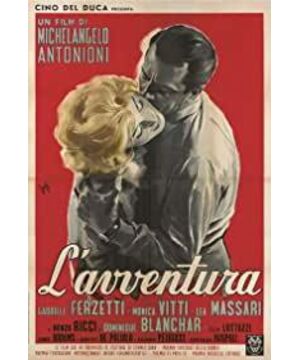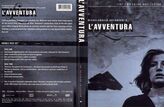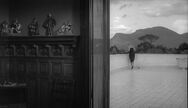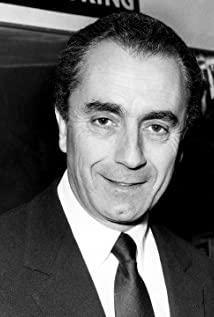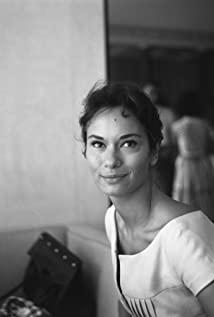The experience is about the same as when I read new French novels many years ago. Fancy reading can only make you feel boring, but if you can throw away the impetuousness and savor it with meditation-like tranquility, you can chew every word in it. Similarly, in Antonioni's films, these words are just turned into shots, and behind each shot there is a meaning that we need to dig out. In addition, although I am not sure whether Antonioni's films were influenced by the new French novels, but the two were produced in the same era, they must have been influenced by the same social trend of thought and philosophical theory at that time. There is no doubt about that. So I will take "Adventures" as an example, and compare the new novels to briefly talk about it, which will help us understand Antonioni's films more.
First of all, Antonioni's film and the new novel have two things in common in terms of narrative. First, both structurally have a tendency to transform from physical time into mental time. "Adventures" tells a story of finding Anna who disappeared for no reason, but the director did not pay attention to the whereabouts of Anna and the process of finding Anna, but turned to the seekers Sandro and Claudia (especially Claudia) psychological process. At first, Claudia was hostile to Sandro, and later the two fell in love, but Claudia tried to suppress her feelings, but when she needed to find Anna, the two got along day and night. Under Sandro's enthusiastic pursuit, K. Laudia also changed from desperately looking for Anna to hoping that Anna would never come back. Just when Claudia was immersed in a sudden love, she found out that Sandro had cheated, causing her to turn into despair. Such tendencies are also common in new novels. Such as French writer Michel Tournier's "Little Prison in the Pacific Ocean", which is a novel adapted from "Robinson Crusoe", but it is dedicated to showing Robinson's psychological changes on the isolated island . First, Robinson was lonely and anxious in an unfamiliar environment, but after a period of time, he became accustomed to living on an island, and in the end he even gave up the opportunity to return to human society. It is also interspersed with Robinson's initial enthusiasm for Friday, to hostility. Second, both abandon the traditional closed narrative in the ending, making the final ending open for readers/audiences to think about. At the end of "Adventures", there is no clear account of Anna's whereabouts and Claudia's discovery of Sandro's derailment. All we see at the end is a long shot of Claudia blankly stroking the head of a sobbing Sandro. Also in "Waiting for Godot" (although it is a play, it can also be classified into the new school of fiction) readers do not know if Godot will come, or even if there is Godot; in Greer's "Jealousy" a novel A pair of peeping eyes observes, analyzes, and records again, guessing, inferring, and imagining a plausible adultery. In the end, the reader still has no way of knowing whether the adultery was real or just out of thin air. It is precisely because of these two points that Antonioni's films rebel against the traditional classic narrative that the uniqueness of his film form is created.
Secondly, in terms of style, Antonioni used to use the empty shots of buildings or landscapes as the background, and they kept repeating them. Likewise, the depiction of separate environments in new novels is commonplace. For example, Duras's "The Lover" has a large amount of space, and the description of the Mekong River is constantly repeated. This kind of description can enhance the atmosphere, such as "the yellowish Mekong River floats with vegetable leaves and debris, the river is turbulent, and the earth is sloping" This sentence shows the despairing tone of the entire novel. Second, it has a symbolic meaning. The Mekong River symbolizes the time that will never return. When the protagonist recalls the past, everything is like a drifting thing on the Mekong River, which is gone in the long river of time. The isolated island on the sea level in "Adventures" is permeated with a sense of loneliness and alienation, and at the same time it also symbolizes a person who is alone in society. Different from the novel, the empty scene in the movie has another important function, which is to leave the audience time to think. The audience can think and recollect the whole scene of the film in the empty lens. In addition, Antonioni is accustomed to use slow-moving long shots to present the characters' emotions objectively and objectively, often without the intention of evaluating them. One of the reasons why the new novel is also called "anti-literature" is that it refuses to create distinct telecom characters, expressing the characters' emotions and fates. The objective description of things, as for the opinion of the characters in the novel, it is left to the readers to judge.
Finally, I would like to talk about the same subject matter expressed by both. One of the recurring themes of Antonioni's films is that the protagonists lead sensual lives, but otherwise they live empty lives without purpose. This is a character's numbness to life, but at the same time it is also a tension between man and reality. Influenced by modernist novels and existentialist novels, the new French novels focus on the inevitable conflict between man and the world of existence, and the irreversible trend towards vulgarity.
Due to the author's limited knowledge and space limitations, the analysis of the relationship between Antonioni's films and the new novel ends here. Yu Hua once said, "A good novel is to express the tension between people and reality". If you apply this standard to the movie, then Antonioni's movie is also a good movie.
View more about L'Avventura reviews


